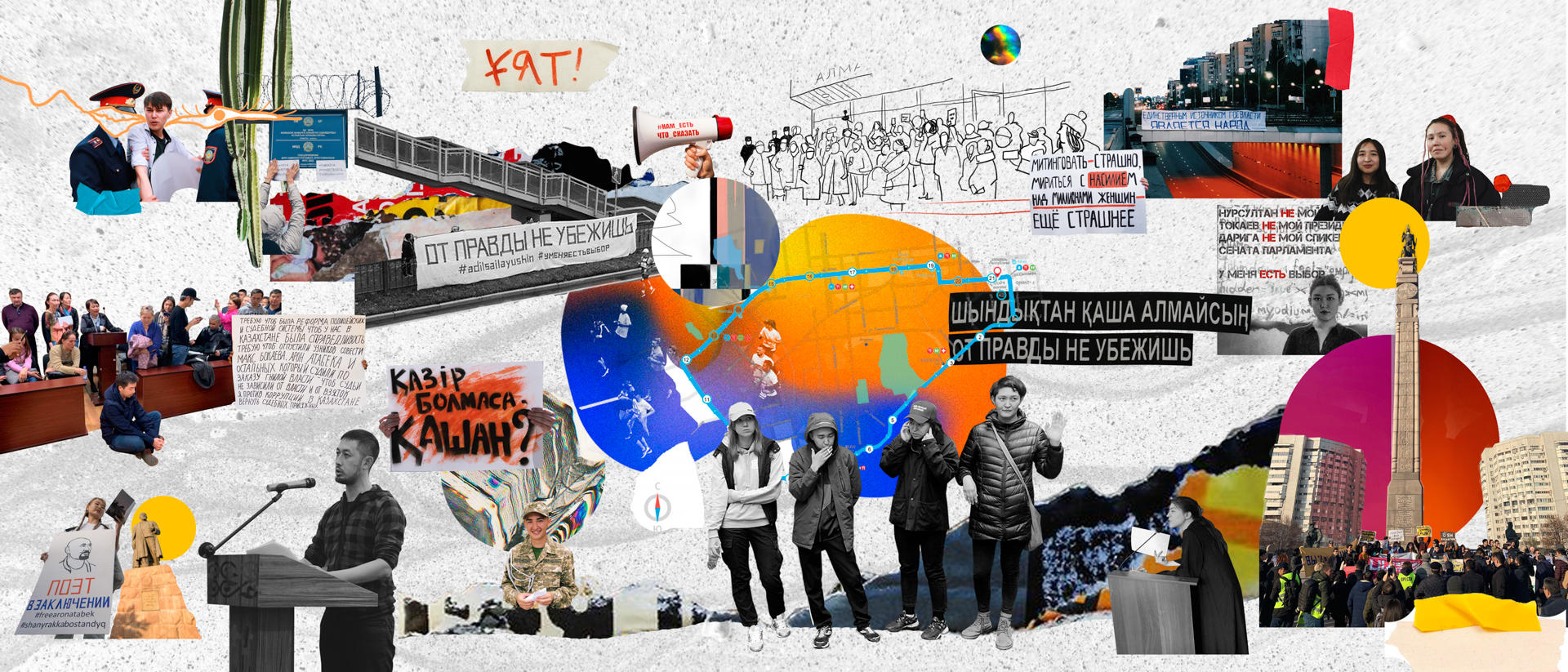On the morning of April 21, 2019, a group of young artists, civic and environmental activists unfurled signs at the Almaty Marathon that read, in Russian and Kazakh, “You can’t run away from the truth,” “I have a choice,” and “Adil sailaý ushin” (“For fair elections”). Some activists were arrested by police during the protest: Beybarys Tolymbekov, Asya Tulesova, Suinbike Suleymenova, Aigul Nurbulatova and Aidos Nurbulatov.
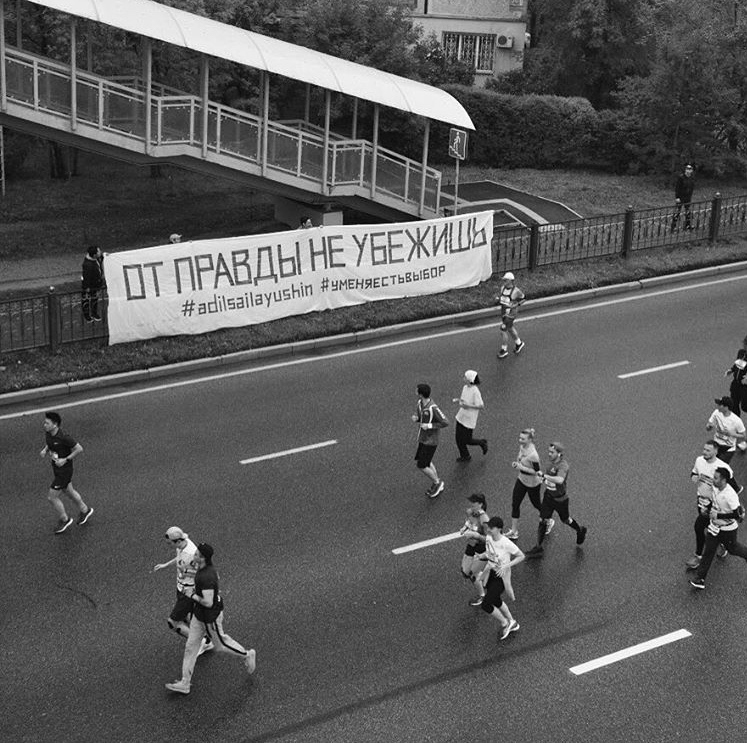
At the district police station, the activists were not allowed access to lawyers and were not given food or water for several hours; this included the pregnant Suinbike Suleymenova.
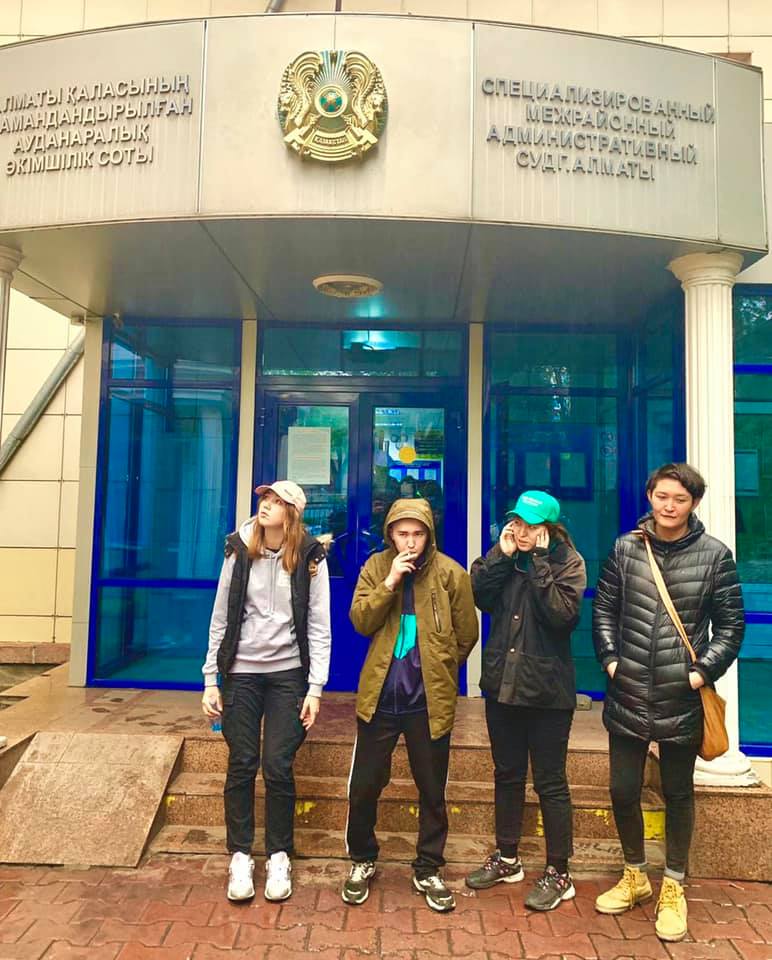
Photo: Timur Nusimbekov
The activists’ trials took place shortly after the protest; two of them were held in the evening that same Sunday. All those arrested were found guilty by the court under article 488 of the Code of the Republic of Kazakhstan on Administrative Offenses—“violation of the law of the Republic of Kazakhstan on the procedure for organizing and conducting peaceful assemblies, rallies, marches, picketing and demonstrations.” As punishment, camera operators Aigul Nurbulatova and Suinbike Suleymenova were fined, and Asya Tulesova and Beybarys Tolymbekov were sentenced to administrative detention.
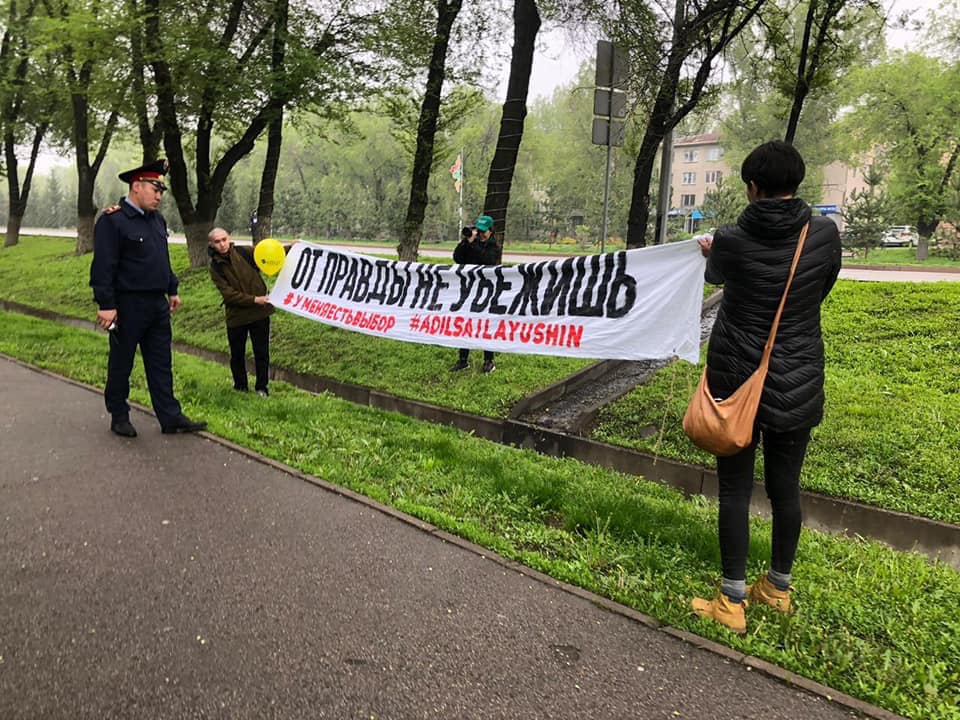
The activists pleaded not guilty.
Asya Tulesova’s speech in court went viral; it was quoted by dozens of media outlets in Kazakhstan and abroad.

Several days after the “You can’t run away from the truth” protest, a banner was unfurled over an Almaty street, quoting from the Constitution of the Republic of Kazakhstan, “The people shall be the only source of governmental power.” The artist Roman Zakharov was arrested for this protest art.
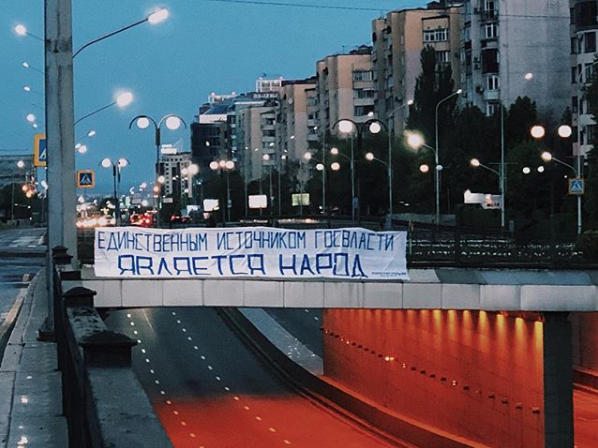
While incarcerated, security forces provoked Asya Tulesova and Beybarys Tolymbekov. Asya Tulesova was attacked by a fellow prisoner. Asya Tulesova maintained a hunger strike for her entire sentence as an act of protest against the unjust court system. Some Kazakhstani and international human rights organizations recognized Tulesova and Tolymbekov as prisoners of conscience.
The protest art in April and subsequent political pressure and repressions against activists and artists led some parts of Kazakhstani civil society, as well as artists, to mobilize. Hundreds of civic activists, artist-activists and students in all major cities of Kazakhstan (Almaty, Astana, Shymkent, Uralsk et al.) and in other world cities (London, New York, Rome, Berlin, et al.) staged protests in solidarity with detainees.
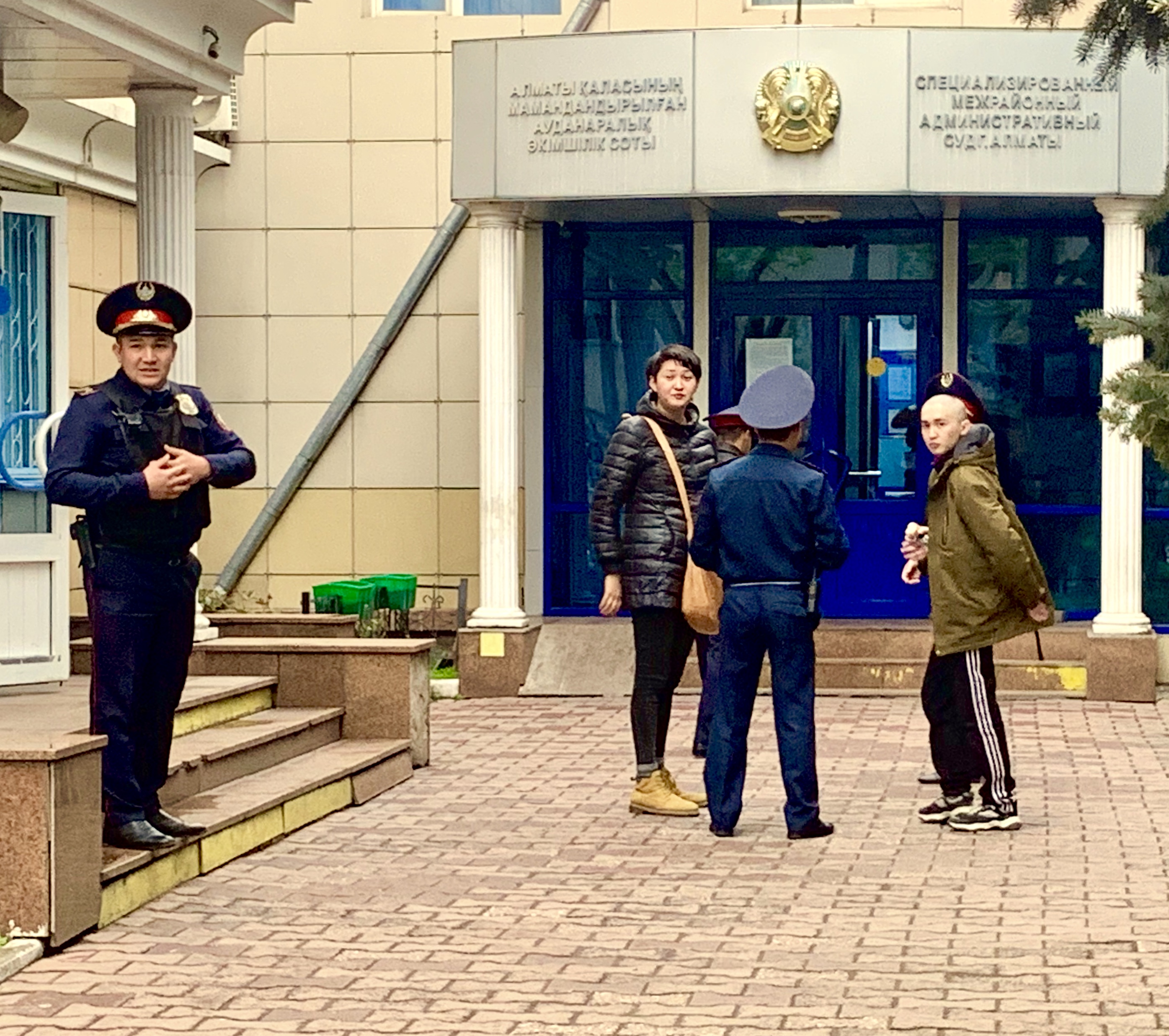
The phrases “You can’t run away from the truth,” “I have a choice,” and “Adil sailaý ushin” went viral and not only started trending on social media, but also began to figure in pickets and mass rallies.
In the spring and summer of 2019, over four thousand people were subjected to arrest and detention in Kazakhstan. According to Kazakhstani and international organizations and the UN, these arrests and detentions violated fundamental democratic principles, the Constitution of the Republic of Kazakhstan and international norms regarding the freedom of assembly. 2019 in Kazakhstan was also characterized by the authorities’ repression of the media and free speech. Police and special units, as well as “titushki” (mercenaries acting as agents provocateurs) were deployed against journalists and activists. Moreover, all of the main social networks and messenger apps in Kazakhstan were subjected to large-scale blocking.
The pressure on activists has not ceased in 2020. In February the civic activist Dulat Agadil died in a pre-trial detention center a few hours after his arrest. On March 1 citizens in cities across Kazakhstan who came out for peaceful rallies in Dulat Agadil’s memory were subjected to mass arrests. In April civic activist Alimzhan Izbasarov was “driven to attempt suicide,” according to a relative, and was later transferrred to a psychiatric hospital. On April 17, under a state of emergency and quarantine, environmental and civic activist Alnur Ilyashev was arrested.
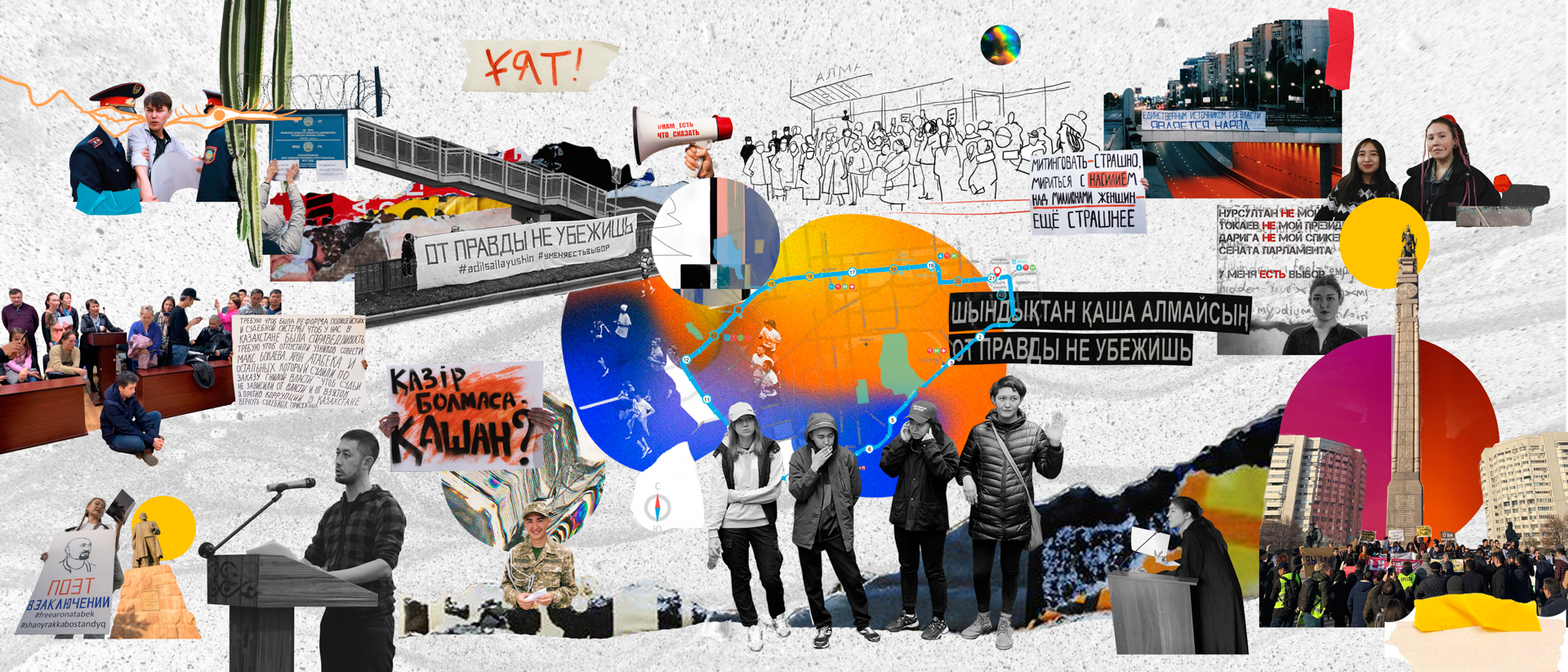
Today, exactly one year after “You can’t run away from the truth,” we contacted the key participants in the protest, as well as the people who, in one way or another, were connected with it—before, during and after. We asked each one to remember that April day and the 12 months that followed, reflect and answer four questions:
1. What did the “You can’t run away from the truth” protest and the year after April 21, 2019 mean to you personally?
2. How, in your opinion, has the protest and the following year affected the country and society?
3. What key events and/or changes occurred in this period?
4. What will the year after April 21, 2020 be like?
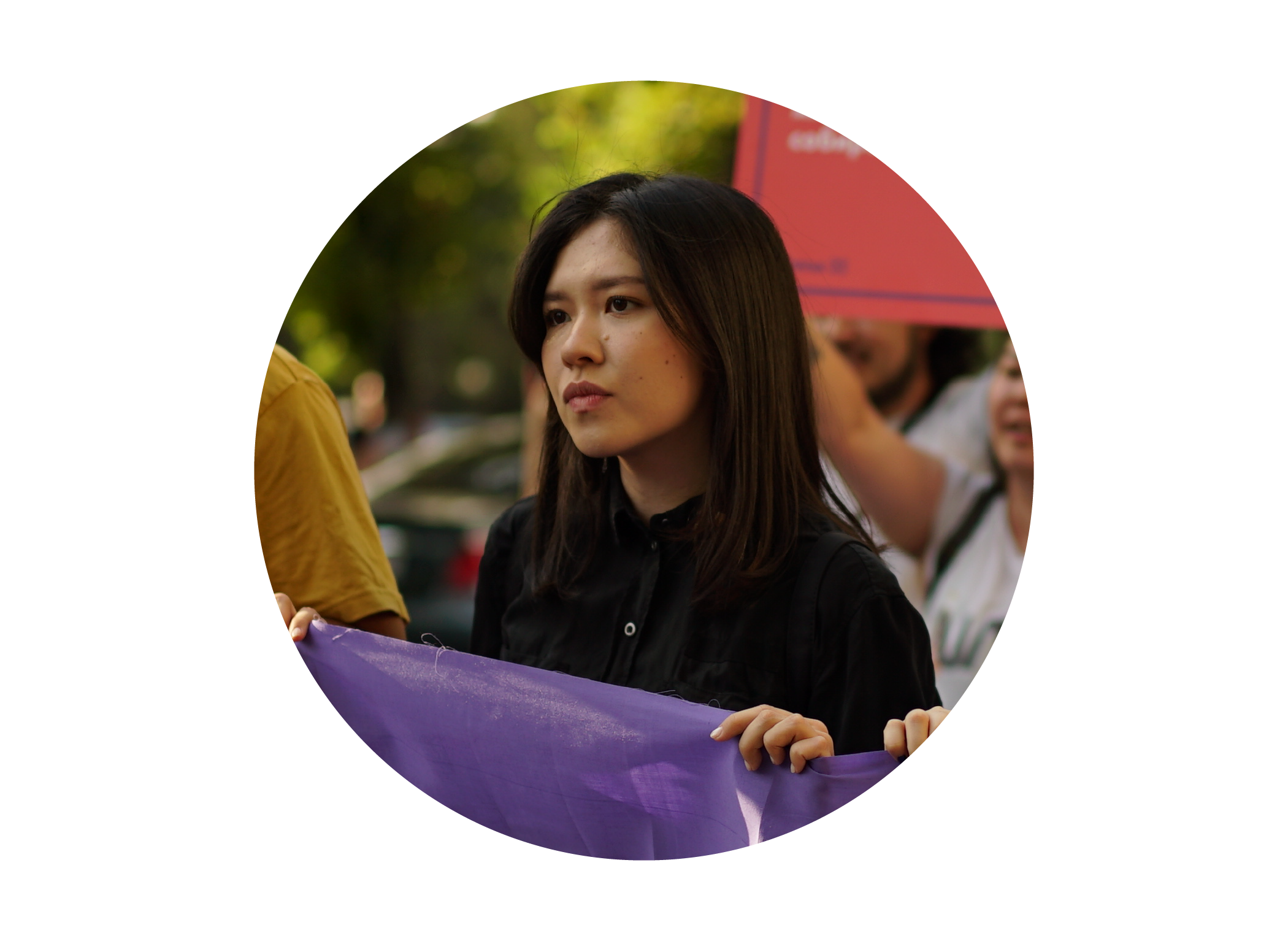
Tamina Ospanova
photographer
Tamina Ospanova took the famous shot of marathon runners running past a banner reading, “You can’t run away from the truth.” The photograph immediately spread across social media; it appeared in Kazakhstani and international media covering the event.
“Life is no longer the same, undoubtedly. We witnessed an unjust court, waited for our friends to come back, saw Beybarys off to the army; I remember all of this like a dream. This year I met great, brave people; we learned from each other and supported each other in every way; I learned a lot of new things about politics, about our rights, how important it is to understand all of this and deal with it. Even if it seems like it has nothing to do with you.
After the snap election was announced, the ‘You can’t run away from the truth’ protest became a kind of point of no return in the minds of citizens. We saw support from Kazakhstanis all over the country and outside its borders and a subsequent wave of protests. There were a great many solitary pickets; at some point they stopped arresting people—it seemed like we were breaking through a thick, invisible wall. But then a new spring came, beginning with the ‘abduction’ of activists on the first of March.
The “You can’t run away from the truth” protest became a kind of point of no return in the minds of citizens
Of the whole series of events, I want to highlight: the creation of a political reform movement, Oyan, Qazaqstan (“Wake up, Kazakhstan”). The morning when the residents of Arys woke up to the sound of explosions. And the death of Dulat Agadil, incarcerated in a pre-trial detention center. The recent release of Dzhakishev and a lot of other things.
At the moment it’s hard to think about the future; there’s a sense of uncertainty and being in a kind of limbo. But civil society is growing with each year; it reacts and makes demands. I believe that we must deal with all of it, staying home and taking care of oneself, providing informational support, while the state of emergency is being used to suppress dissent. Passive activism is also activism, and the pandemic will not last forever. Follow OQ.
Regarding the photograph that blew up on all the social networks. I definitely expected there would be a reaction to the protest itself, but not specifically to this shot; there were other shots from the same day. I remember how the marathoners ran past and reacted to the banner; some whistled in support or gave the finger. I remember the cheers and how the people holding the banner shouted, ‘Fair elections for the honest people.’ I was standing on the bridge and taking photos from above; the energy of everything that was going on was unbelievable.”
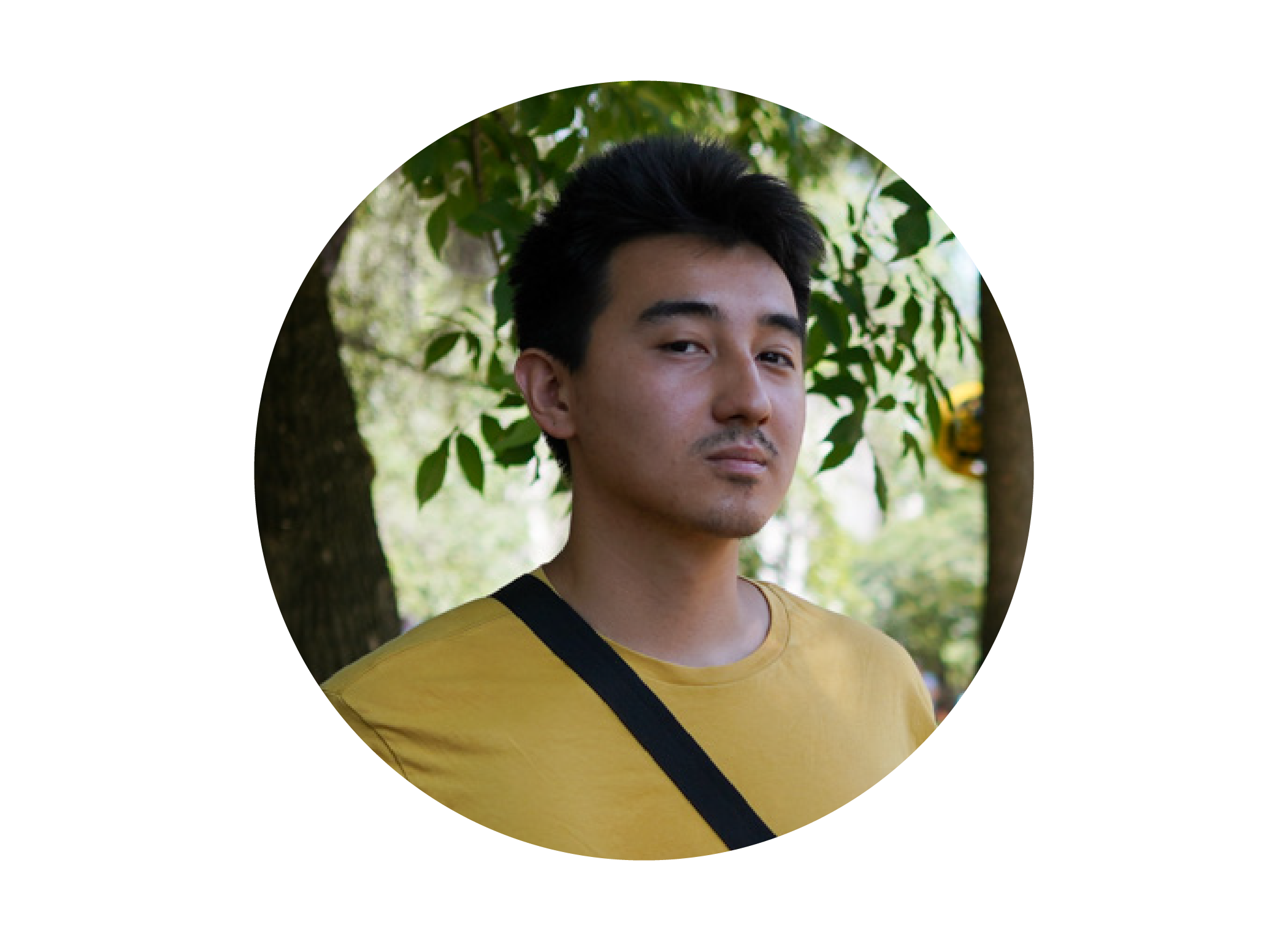
Bauyrzhan Sabitov
photographer, filmmaker
Bauyrzhan Sabitov coined the phrase “You can’t run away from the truth,” which became an enduring symbol of the protest and activist movement after April 21.
“A year of worries, emotions, struggle and friendship.”
This protest was probably the highest-profile event of last year; essentially, no one was indifferent—some supported it, others criticized it, but it did not go unnoticed anywhere. People started to be less scared; the ice of fear began to melt.
The key events in my view are the emergence of Oyan, Qazaqstan, the rallies in June and, probably, December 16.
A lot has happened in a year, but changes don’t happen all at once; it seems to me that this year there will be more hardship even than in the past, since the powers that be are not turning towards the truth, but continuing to run away from it. But the further away you are from the truth, the faster it catches up with you.”
The further away you are from the truth, the faster it catches up with you
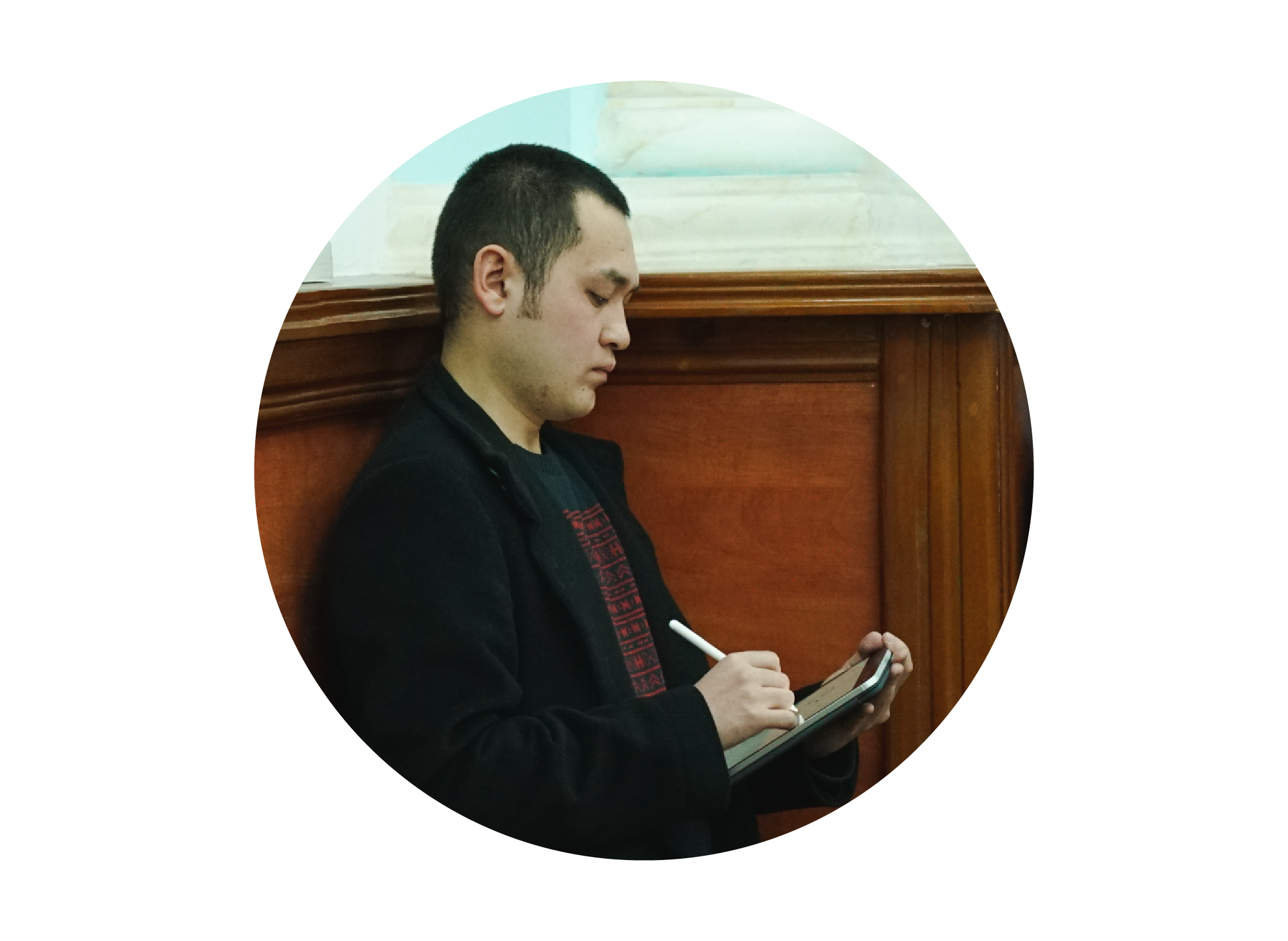
Roman Zakharov
artist
Several days after the “You can’t run away from the truth” protest, when Beybarys Tolymbekov and Asya Tulesova were already in prison, a photograph appeared online of another banner in Almaty: “The people shall be the only source of governmental power” (quoting from the Constitution of the Republic of Kazakhstan). Roman Zakharov was arrested and convicted for this protest art piece.
“When the protest was being prepared, no one counted on such a strong effect, but our legal system helped with that. For me personally, it meant a lot; my eyes were opened to many things by this experience. Then we wanted to break the awkward silence. For changes to occur, first you need to define the problem, which we eventually managed to do.
For many people the protest was another reason to reflect: what is going on in our country and why is it happening? There is something wider than just the inner circle of my personal interests, and that something ultimately affects the “inner circle.”
There is something wider than just the inner circle of my personal interests, and that something ultimately affects the “inner circle”
In my opinion, these are the key events:
-The creation of new social movements
-The elections, which showed that, systemically, nothing in our country has changed. And it cannot change quickly. Until our understanding of the law, of the fact that corruption is a crime, begins to operate on an elementary level in our heads, this will continue in schools, hospitals, on the street—basically, in simple everyday life—and we will keep living like this.
History cannot be foreseen. But we all see what is happening in the world and in our country, and it’s not hard to guess that this will be a difficult year.”

Tatiana Chernobil
Humans rights law consultant,
consultant for Amnesty International on Central Asia
After the “You can’t run away from the truth” protest, Tatiana Chernobil provided considerable support to imprisoned activists. She advised activists, their families and friends and helped to swiftly organize legal aid for activists who came under pressure in the following months.
“I found it unexpected, very brave, creative and very free. It was everything that, in a word, I and many others felt we could not afford. I was glad that this was the voice of the youth, especially with such a creative streak. And that slogan, “You can’t run away from the truth,” sounded like a rebuke, a righteous rebuke, and to my conscience as well. It wasn’t that I was running away from the truth, but I also can’t say truthfully that I was running towards the truth. And that’s the main thing. I was happy that spring. Happy for our shared liberation. It felt just like that. It was such a shift from words to action, sort of. And everything that happened later was also impossible not to commit to memory—the trials, rain at the special detention center on Lobachevsky st., Beybarys’ conscription, then Alimzhan’s, the protests before and during the election, the election itself, the first seruen (symbolic walks), poring over the administrative code, memos for activists about police interaction, more trials, rallies, arrests, searching for lawyers, vigils at police stations and again seruen. All this was so wonderful and encouraging. It’s still that way even now. More mature, hardened, in some aspects cynical, but nonetheless cheerful and encouraging.
It was a shift from words to action
This protest was an impetus to wake up. People realized that, it turns out, it’s possible. “You can’t run away from the truth” became almost a common noun, and the participants in the protest became heroes. The achievement of ‘You can’t run away from the truth’ also lies, I think, in the fact that today, it’s rare for someone to get 15 days’ arrest for a peaceful act of protest, like they gave Asya and Beybarys. This protest, then, cultivated a new protest movement that gave opportunity and a mouthpiece to those who did not associate, or did not want to associate, themselves with the current political opposition. I don’t know how events would have developed if not for this protest. But it happened. And I, as a Kazakhstani, as a human rights defender, am very grateful to the people behind ‘You can’t run away from the truth.’
The key events in the civil sphere? If I were to name three, it would be the emergence of ‘Oyan, Qazaqstan’ and its declaration, the Friday seruen in the summer and marches on Constitution Day and November 9. It would be Alimzhan Izbasarov’s court appearance on May 4. And it would be the women’s march on March 8 of this year. I would add a fourth—naturally, the high degree of civic activism during the elections and the unprecedented mobilization of independent observers.
For a start, we need to wait till the end of quarantine without wasting civil resistance and insistence. What happens next with the implementation of the new law on peaceful assembly, if it is passed, will be interesting. Somewhere around there there will be more parliamentary elections. And it will be crucial for us, as a civil society, to see to it that our quarantine reality doesn’t take root and that all of the restrictions are lifted in a timely manner. Quarantine, of course, has brought adjustments into our lives, but I think the gains and achievements of 2019 will stay with us, and our civil society will prove itself with even greater confidence.”
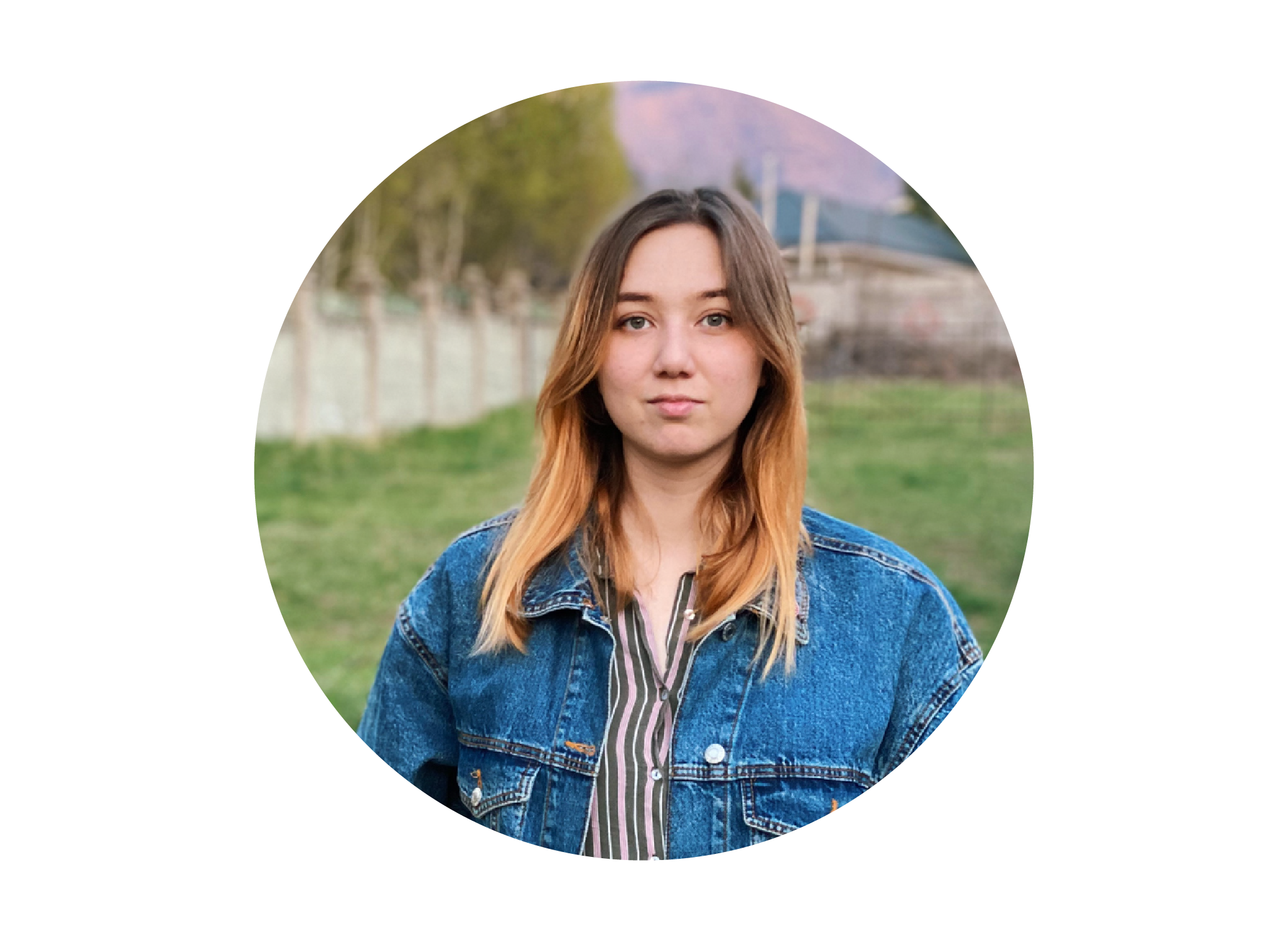
Aigul Nurbulatova
cinematographer
On the day of the marathon, Aigul Nurbulatova filmed the “You can’t run away from the truth” protest on a video camera, for which she was arrested by police. A trial took place soon after, where she was found guilty under article 488 of the Code of the Republic of Kazakhstan on Administrative Offenses and fined 20 MCI (monthly calculation index). Despite the pressure, she continued her professional activity and filmed all the key events of the 2019-2020 activist movement in Almaty.
“None of us expected such a reaction from the authorities and such support from the people. For me, life in Kazakhstan is divided into before and after the protest. After the protest it became clear that no one in this country can feel secure; now, each morning begins with watching the news, since it’s possible that, while you were sleeping, your friend was arrested.
Then I saw for the first time with my own eyes how the Nurbot attacks work and how our authorities try to shut activists up; it was dirty and pitiful—rumors, slander, heavy trolling.
The protest became a point of reference for most people for protest sentiment in the country. I don’t think that it was about the protest itself; dissatisfaction had already been brewing for a long time, and this high-profile event emblemized the fact that the youth will no longer keep silent. I think this protest showed us how the common people ought to react to injustice—we began gathering at the courts, at the police stations. Support and solidarity became part of our lives.
Support and solidarity became part of our lives
For me, the major change this year was people’s attitude towards peaceful assembly. Our people view rallies in the darkest light—this is most likely a consequence of propaganda. Throughout the civilized world, peaceful assembly is a normal means of communication between the people and the authorities. In our country any dissatisfaction or criticism towards the regime is considered a call for violence. We don’t want violence—we want to improve life in this country. I think that, thanks to peaceful protests in 2019, people saw that rallies are nothing to be afraid of, and that unrest and violence at rallies is orchestrated by the authorities and ‘titushki.’
2020 is an enigma to me; the situation changes every day. I think this crisis will teach us a great deal. And we are finally becoming aware of our own strength as a people.”
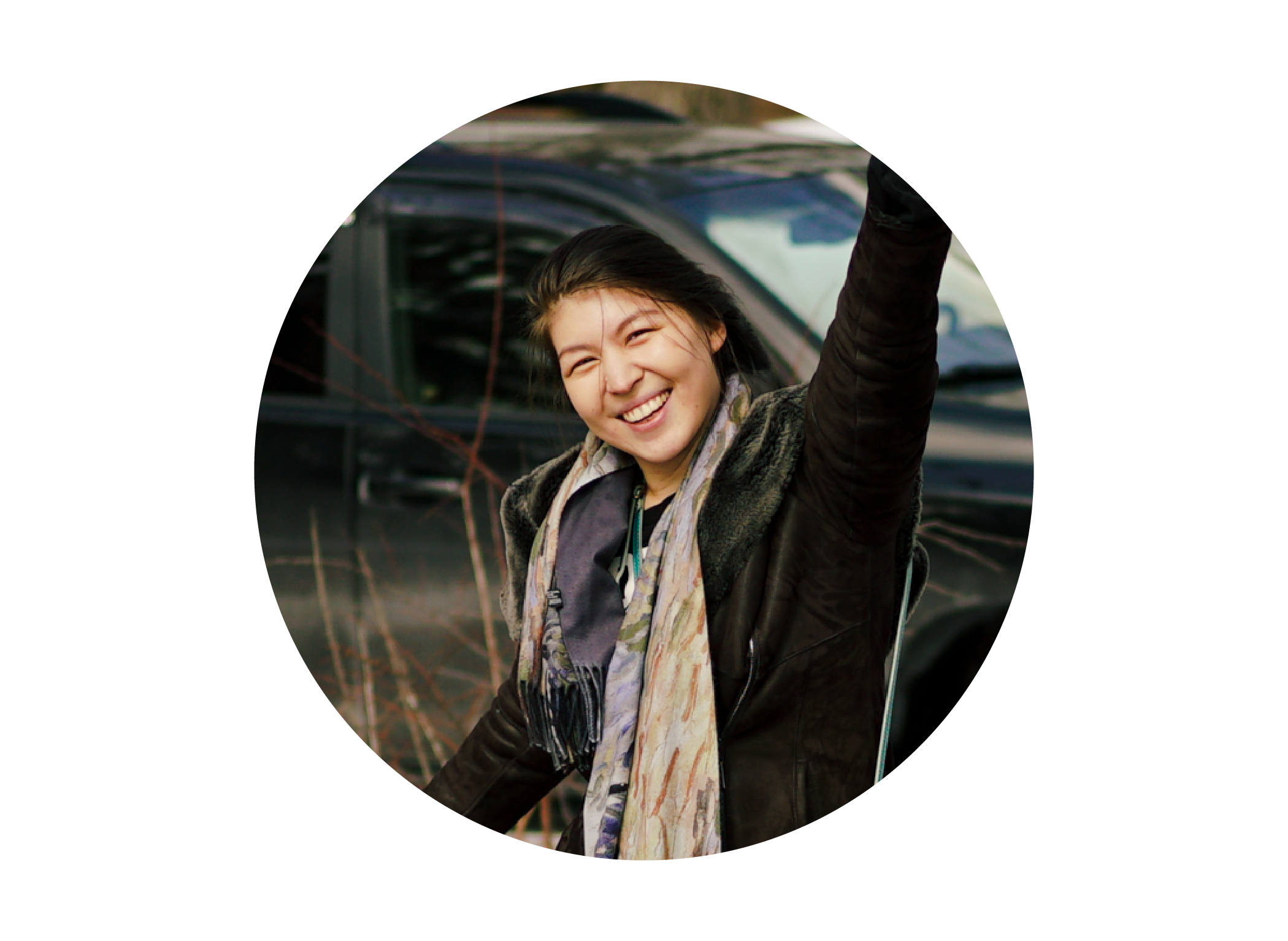
Suinbike Suleymenova
artist, filmmaker
Like Aigul Nurbulatova, Suinbike Suleymenova was arrested for filming the “You can’t run away from the truth” protest and was found guilty in a court ruling of a “violation of the law of the Republic of Kazakhstan on the procedure for organizing and conducting peaceful assemblies.” In her court appeal, she gave a speech in which she talked about her attitude towards what was happening. At the time of her arrest and court appearances, Suinbike was pregnant. Her son was born in November 2019.
“#youcantrunawayfromthetruth was a momentous event. It split my perception of time in half like an axe. That and the fact that Tau was born. I am still processing these two events.
We saved Kok-Zhaylyau; Oyan, Qazaqstan!; ‘We, Kazakhstanis, are people of freedom…’; we exercised our constitutional right to peacefully assemble where we want; the first large-scale women’s march took place; an election took place that Kazakhstanis wanted to observe and participate in; the events in Korday; Xinjiang; the Democratic Party of Kazakhstan and Mamay; AUA’s petition for clean air and against cogeneration; Dulat Agadil died in prison; Nur Otan vs. Alnur Ilyashev; Alnur Ilyashev was imprisoned...in all, a total #qazaqkoktemi (Kazakh spring).
Now, post factum/post-quarantine, we are all looking around and thinking: do we want to live like before? No. Forced awareness pushes us to many discoveries and revelations, such as decentralization, de-urbanization, returning to the land, awareness of one’s own center. The sense that this time, and my/our participation in it, is important, has only grown louder, in my echo chamber at least.”
We are all looking around and thinking, do we want to live like before? No.

Beybarys Tolymbekov
Civic activist
After his release from custody, Beybarys Tolymbek was sent to serve in the armed forces of Kazakhstan in May 2019. From that time up until today, Beybarys Tolymbek has been serving in Otar, Jambyl region. In January 2020 he wrote a post that directly concerns the “You can’t run away from the truth” protest, in which he reflects on the current situation in Kazakhstan.
“...2019 was a year of solidarity, mutual aid, faith and hope in a bright future.
2019 was a year of close contact between young people and the government, and the beginning of an asymmetrical dialogue between the government and society.
And in the end, this is the beginning of a transition to an engine named ‘transition of power.’
History is always contradictory, but there is unity in these contradictions, and this unity comprises the system.
This is the whole of contradictory Kazakhstan, which managed to build a country in nearly 30 years that is a hybrid fusion of backstage, fixed Soviet nomenklatura and capitalism. A country with double standards where democracy, freedom of speech and judicial independence are proclaimed, but in fact everyone sees dictatorship, totalitarianism and repression. And, finally, they built a society where people know what is happening, know why it is not right and why it should not be so, but in fact advise others to sit quietly and not to point out the truth.
History is always contradictory, but there is unity in these contradictions, and this unity comprises the system
People became estranged from the truth.
But, luckily, history has a tendency to keep moving and to resolve its contradictions.
The product of this contradiction were the youth who had not lived under the Soviet Union and were too young to remember the social situation of the ‘90s. This generation is like the Israelites in the desert—free of the negative memories of global transformation and the attraction to a “stable” life.
And it was these youth who became the engine of the new protest.
The first blow was to the values imposed by the authorities, who for all these years stubbornly tried to create a new cult justifying typical authoritarianism. The youth showed that they live according to their own values, which run contrary to the efforts of the powers that be.
This is how the slogan ‘Nur-Sultan is not my capital’ came to be.
History did not stop on its path after that, and the authorities had to endure another blow to their double standards. People began paying greater attention to the fact that the official statements of the masters, the servants of the people, weren’t quite lining up with their actions.
The youth were inspired by ‘you can’t run away from the truth’ …”
The full text is available on Beybarys Tolymbekov’s Instagram.
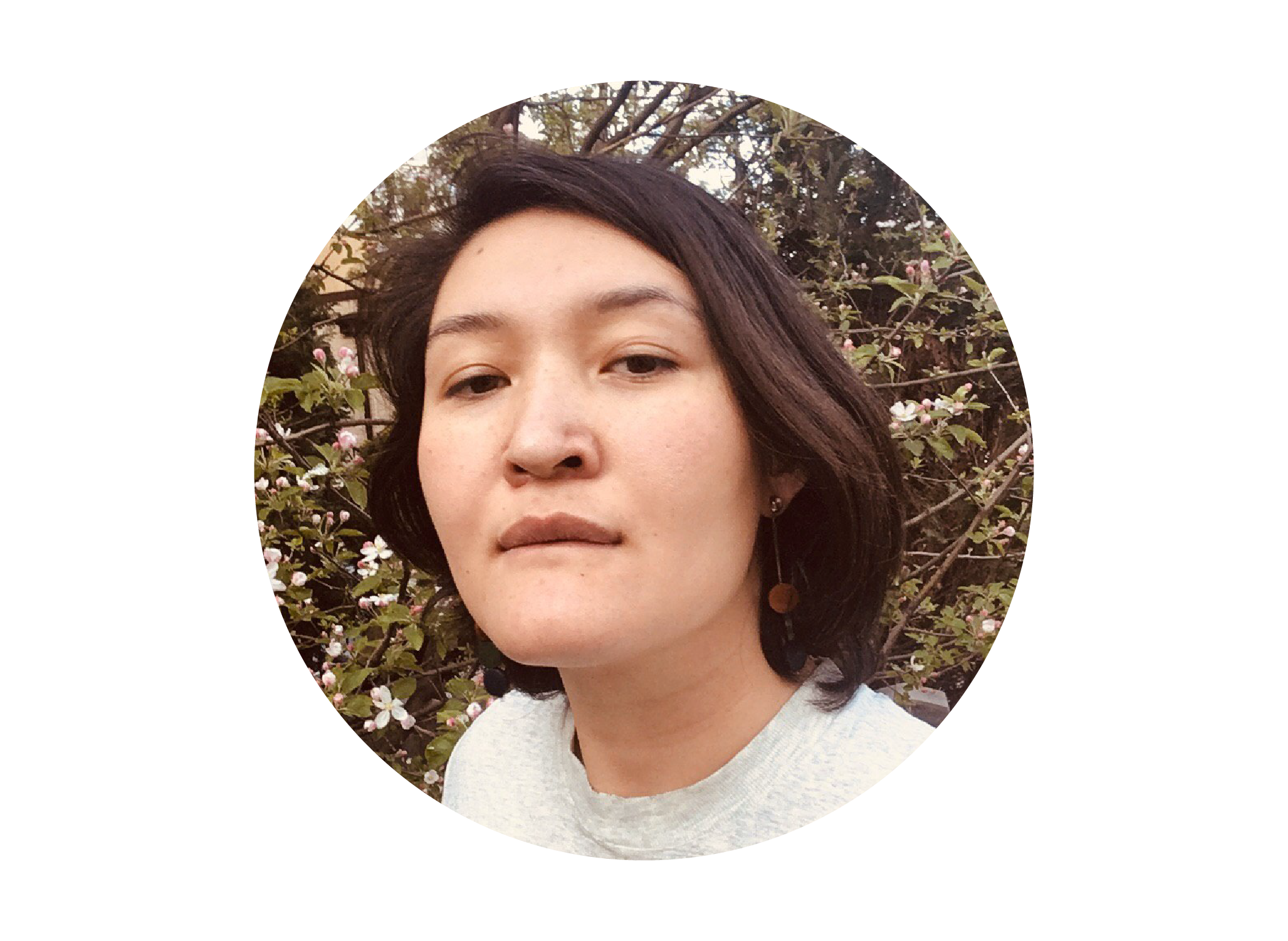
Asya Tulesova
Eco-activist, cofounder of the public foundation Common Sense
and creator of the Almaty Urban Air project
Along with other participants in the “You can’t run away from the truth” protest, Asya Tulesova was arrested by police on April 21. Her trial took place the evening of the same day, and she was found guilty of holding an unsanctioned rally. During her trial, Asya Tulesova gave a profound speech that was later quoted by media and activists on their signs in numerous protests of solidarity in Kazakhstan, Europe and the U.S.
“On April 17, 2019 I made a post about how I felt at the time, about how I wanted to live through something intense, powerful and draining, and that I was on standby, as if anticipating what was coming next. That year I met Beybarys through our mutual friend Mariam, and we talked a lot about politics and drank a lot of green tea at Le Janbyr. I even tried to speak broken shala Kazakh, since Beybarys started teaching it to me. Various people struck up conversations with me on various subjects, each one about something different: some complained about their lives, some talked about how it was time to do something. A puzzle began to take shape of groups of young people who didn’t know each other but were united in their understanding or sense of the fact that something is wrong with our system. It was really inspiring, as the general defeatist mood, imbued with powerlessness and fear, that was dominating our society was sucking the vitality out of me bit by bit. We discussed things a lot, came up with protest ideas and ran around Almaty at night. It was exciting. And then came “You can’t run away from the truth”; the rest is history. In an interview, Alibekov dragged a confession out of us, that we planned all of it. Yes and no. We planned the paint, fabric and slogans, but everything that happened next was complete improvisation. We were acting based on the circumstances, answering questions sincerely; like radios, we broadcast what was in the air. It was great not to be afraid, not to be afraid to shout, to say what we think. It was great to feel unity, care and faith that we can do it. It was great to feel support for one another. For the first time I felt that our country is a country, not a bunch of little towns scattered across the steppe who don’t care about each other. That our nation is a nation with shared ideals and faith in one another. That there are many of us alone in the field.
It was great not to be afraid, not to be afraid to shout, to say what we think
2019 brought a great deal of disappointments and grief, but it also brought many happy changes. And so what, can our government precisely predict what one or the other year will be dedicated to? 2019 was the year of the youth, and it really was their year. I had never heard so many bold statements from young Kazakhstanis before. All those speeches in court, songs, seruen. State control and politics, now and hopefully for a long time, is the new black.
All of last year went by under the flag of protests, in Kazakhstan and the whole world. People protested and protest against the tyranny of state officials, the usurpation of power and lack of elections; rallies of mothers with large families, artists’ solitary pickets and marches—all of this is important, just like the thousands of arrests, torture, the death of Dulat Agadil. Then Arys and the endless procession of frightening events, exposing the absolute corruption and parasitism of our governmental system. And, of course, the COVID-19 pandemic, whose consequences will be a test of endurance for us all and, I hope, will help us to prioritize our lives correctly. Today, the authorities cowardly carry out the arrests of civic activists like Alnur Ilyashev under cover of night. But I know that “at first they don’t notice you, then they laugh at you, then fight you, and then you win.” That’s how it is. I could say something about ‘regime change,’ about ‘elections without choice,’ about ‘the game of thrones,’ but it’s not that important. It’s important that we at last ‘kill our inner dragon’ and stop being afraid to speak the truth and live.
I think all events in our lives are cause for reflection. Time will tell. What I am completely certain of are the laws of karma: ‘you reap what you sow.’ Love to all.”
Throughout the year Adamdar/CA has covered the key events of the activist movement that developed and strengthened after the “You can’t run away from the truth” protest. All publications on this topic are available in the DOCA special project at this link.
